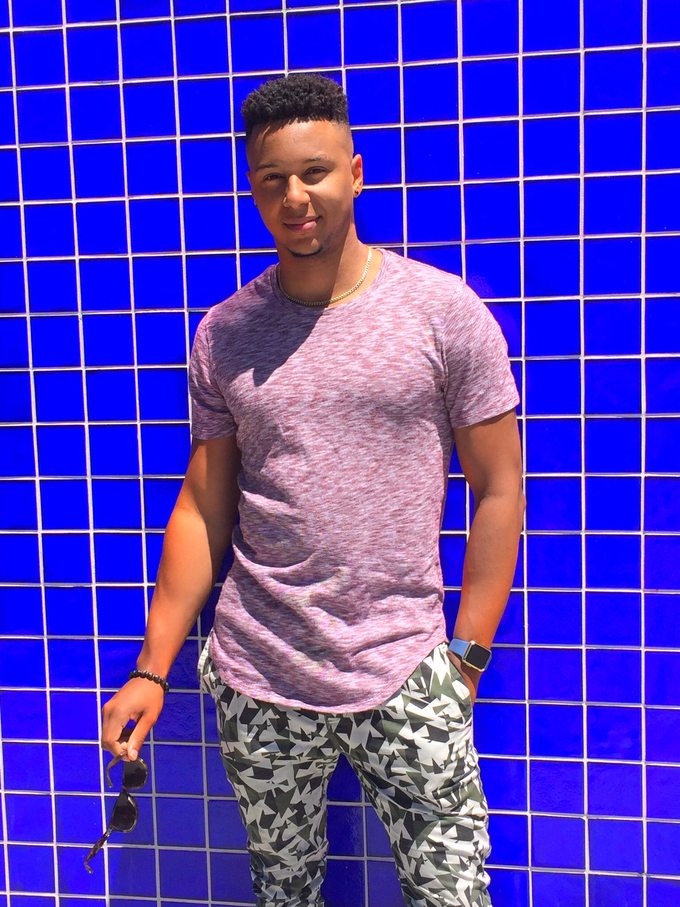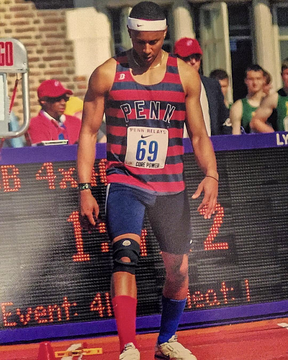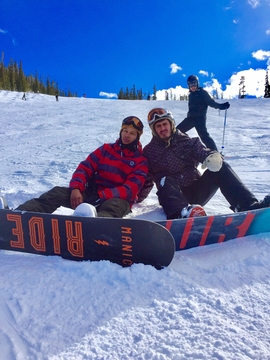Nick Straughn: Turn Back to Your Strengths
September 11, 2018
 First-year D10 San Francisco Bay Area athlete Nick Straughn is a Product Manager at Adobe.
First-year D10 San Francisco Bay Area athlete Nick Straughn is a Product Manager at Adobe. You’re part of The D10’s growing “UPenn Mafia.”
Kristen Judge and I were on the same track program in college, and we had the same network of friends here in San Francisco, so she tried to recruit me for the event in 2016. I was in a bunch of men’s basketball leagues, so I put it on the backburner. Friends of mine in the New York area - Austin Josiah, Kamar Saint-Louis - were getting into it at the same time, and so this year I said, “Yeah, let me start working on this.”
How fundamental would you say athletics have been to your life?
Sports really gave me the platform to be able to express myself. It always gave me a home, a place where I could be myself, do my thing, leave everything at the door. It really weeds out a lot of the noise and the clutter that goes on in life.
Another side of it is, I have an older brother and an older sister who still live in the Caribbean. They’re nine and eleven years older than I am, so I grew up in an only child household in New Jersey. As an athlete, I was able to build a great core of friends who stayed with me my entire life.
With that sense of camaraderie, you learn that it’s not all wins and losses. There are things you can maybe learn in other contexts that I think sports teaches you very early, if you’re fortunate. What is a strength? What is a weakness? Being an athlete forces you to be introspective and define what’s valuable to you.
What was your college athletic experience, and how do you think it carries over to The D10?
I was a long- and triple-jumper at Penn, and I did a little sprinting as well. My body type is set up - and certainly the way I’ve trained is - to be an explosive athlete. The 40, the Broad Jump, the Vertical and the Shuttle are the kinds of things that come naturally. I’m excited to see if I can pull back what I did in my prime. For the Bench Press and Pull-Ups, I’m hoping to muster up the strength and the adrenaline to pull something out, or even just to be at a serviceable level after a recent shoulder injury. The 400, the 800 and the Row, I have no baseline, really. I never ran the 400 in a real track meet before.

Before undergrad at University of Pennsylvania, you were born and raised in Central Jersey. How did you come to land in the Bay Area?
I chose a job coming out of school that allowed me to be in the Bay Area, because I had an interest in being here. Coming to the Bay was placing a bet on myself that I would find that niche and be able to discover what my calling was. It’s the tech hub of North America, and I saw the biggest potential here to get the best return on my time investment.
I had studied economics and consumer psychology. When I first got to school, I had a view of myself that I wanted to be a doctor, that science was the muscle I wanted to flex. I found that I had a natural affinity for economics, and if enterprise is really what you want to go into, it’s important to be self-aware enough to know where your downfalls are, and to get your weaknesses to a functional level.
I think once you’ve done that, you can turn back to your strengths and double down there. You want to have those two or three skill sets that are unique to you when you’re 20 years into your career. Sorry if these answers are all over the place.
I think the “why” behind the “what” is always the most interesting part, and I’m glad you’re taking it there. How does your job with Adobe align with your current interests and skills?
I work on a business model strategy team supporting the education and photography segments at Adobe. So essentially I’m trying to figure out the best ways to get Adobe’s elaborate set of creative tools to students in K-12 and higher education, in a way that makes sense for how schools purchase software, how administrators deploy the software, and ultimately how the end users engage with the products. Our team basically works as an internal consultancy, connecting finance teams, marketing teams, and product teams. The work is very granular in the details, and very macro in that we're looking at the larger effects of what creativity does to the learning experience.
My generation in general is really vying to find forms of work that are fulfilling. We have our 9 to 5, and then we may have our 5 to 9. If we don’t get to cultivate skills in the office environment, we’ll find a hobby that lets us use them.
One of my philosophies is - whatever situation you’re hoping to catalyze - you will not get true buy-in from folks unless they have skin in the game. Even if it’s a situation as simple as trying to make a group dinner reservation, listening actively to what people are saying and making the choice to sample your audience is a great skill set to be developing.
Do you find what you’re doing to be fulfilling?
I recently got promoted, so my skill set has definitely expanded a little. My idealist view of my role is, I have all these tools at my disposal for helping students reach their full potential.

You said you had serious thoughts about pursuing a career in the medical profession. What was it about that that appealed to you?
A lot of that was personal. My Mom passed away from cancer when I was in high school, and I felt I didn’t get a lot of closure. She was a healthy woman. She was where I get a lot of my athleticism from. She was diagnosed with mesothelioma brought on by asbestos exposure, and that didn’t make sense. She worked from home as a sales director. As a minor, there was no way for me to access a lot of information about what was going on, and I really wanted to make a contribution to demystifying that entire space - the hospital system, the prescription system.
I think about health care from a design standpoint, a lot. I think I was a designer in a past life, because good design is something I’m passionate about. Good design reduces cognitive load. It’s really helping the brain do less to get the same result, and health care is a big challenge for effective design. If you aren’t lucky enough to learn from your parents how to navigate those systems and all those gatekeepers, that can be immensely stressful.
In a few years when I get my Master’s degree, and I learn how to influence things at a really high level, that’s potentially an area where I could look to make a contribution. To bring it full circle, though, I felt I had weaknesses in this area that I brought up to par, and once I did that I then focused on my strengths, which are product- and experience-driven.
Given what you experienced and how you responded to it, I doubt anybody had to sell you on The D10’s broader philanthropic purpose. Tell me, though: how have you approached the fundraising as a first-year D10 athlete?
I'll be honest: I was a little apprehensive. I'd never fundraised on a level such as this before. I did a lot of volunteer work in college, children's organizations, after-school programs and athletic programs. Since starting my career, I haven't been able to give back as much in that capacity, so I’m looking forward to being able to translate my volunteerism into fundraising and charitable donations. Working to benefit Lucile Packard Children’s Hospital is an apples-to-apples conversion in terms of working with children.
I’ve already seen that it’s important to have the in-person aspect as well as the social media marketing to generate interest. It can’t be this fleeting thing that comes across somebody’s newsfeed. You have to assume that if there’s an exit strategy for somebody’s brain, they’re going to jump at it. By nature, we are lazy creatures.
Support Nick by donating on his behalf to Lucile Packard Children's Hospital here. Make it interesting by placing a sliding donation on his Marquee Event, the Broad Jump.